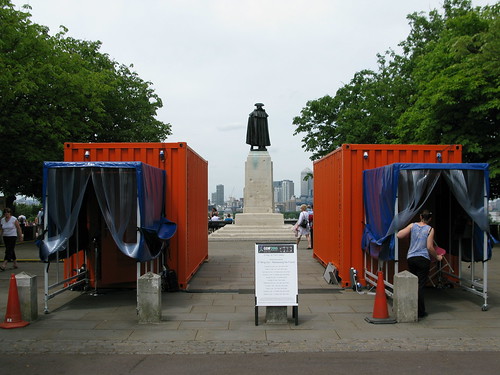“This is a test. For the next nine hundred words, this is a test of the Emergency Publishing system. This is only a review.”
If you heard those words on the telly or radio, you would be both annoyed and scared. Annoyed because of the inconvenience at missing a key scene and scared because the attention signal could mean the end of life as we know it.
In Zoë Svendsen’s play, 3rd Ring Out: Rehearsing Our Future, we act those decisions in the manner of the Choose Your Own Adventure books you might have had as a kid. It starts off as with a somewhat patronising look at the view of Greenwich and Docklands from The Observatory. While it’s patronising for someone who lives here, it literally sets the scene, which takes place in a converted freight container.
After the health and safety briefing, the play starts with an audio montage of news reports of apocalyptic environmental destruction. The play, set over a period of 22 years from 2010-2033 has its first act set the scene by having the audience vote electronically for decisions. One being that a local businessman has made a killing in the stock exchange and has decided to invest in a green business venture. These are an ecosphere, an urban beach and Greening the cities with foliage atop the buildings.
The actresses who host the play take the roles of architectural consultants, cabinet advisors and civil servants whenever a decision has to be made. The decisions are made electronically with the use of a three button keypad and you vote on each one.
A key decision is that you’ve got to decide about the flood defences for London and the coast of England and Wales. One actress asked us: “How does it feel to spend £45m?” Basically, in doing so, you have to juggle priorities. Flood defences or NHS, for instance. By Act two, this is unfinished, being over time and over budget.
Act Two is where things really get interesting. The theatre turns into a local emergency command post, where the audience has to decide what to do when there is a major incident: a heat wave in 2033.
With a map on the table, you responded toincidents by putting plastic figures on it to denote what’s happening. At this point, Augusto Boal’s theory of the spectator becoming a “spect-actor” comes in. The audience reacts to what they see by voting on the decision or moving the action by moving the plastic figures to quell riots and fight fires in a strip of land that included Greenwich, Docklands and the old East End.
Playing the role of being in charge of public order, I had to move police and army to designated areas, or where I think they could do best work. All the while, I couldn’t help notice that it had a somewhat cold war feel to it. It felt like I was the chief executive of Sheffield City Council in the Brechtian drama, Threads. Either that or Doctor Strangelove’s funniest line: “Gentlemen, you can’t fight in here. This is the War room.”
There were lines and scenes that I felt were reminiscent of certain comedies, but denuded of humour to show the effect of climate change on our emotions. One character, Mick Fletcher, the businessman in act 1 said: “I didn’t get where I am today by refusing a challenge”, a line straight out of an apocalyptic Reggie Perrin.
One character on screen in act one, a seventeen year old girl orders an emergency kit from a home shopping channel. The dialogue of this seemed like an Unnovations skit from Charlie Brooker, but without the humour.
The best dramatic device used was the Tower of London collapsing due to subsidence, with the ravens escaping. With such bleak symbolism of London’s decline, it serves to make this play more challenging to our assumptions about permanence and what we cherish as people. In one of the news montages, certain quotes leap out: “I was wrong, says climate sceptic.”
Things go from bad to worse when the heat wave gives way to a thunderstorm that smashes its way through roofs and 20 cm pours of rain down Maze Hill. The decisions shifted form one extreme to another, as the weather changed. We even had to respond to an incident on Canvey Island from a vote on paper when the systems went down. The reaction of the spect-actors was to evacuate the command post.
Being a choose your own adventure, the plot, like the future, isn’t fixed and you influence how others act as a spect-actor yourself. The play ended, raising questions about herd conformity and group think (for me, at least). Why do decisions get made in the way they do? Why are decisions made in groups and why do people vote in the same way? Reading a leaflet given to me, it confirmed what I suspected: the play was inspired by cold war era exercises on what would happen if the Russians dropped the bomb on Greenwich. Interestingly, these container theatres were right outside the statue of James Wolfe in Greenwich Park, which is right across the road from the Old Royal Naval College (Now my alma mater, University of Greenwich) and was a possible key target in my area, along with Woolwich Barracks.
“That concludes this test of the Emergency Publishing system.”
3rd Ring Out was in Greenwich as part of the Greenwich & Docklands International Festival. Visit http://www.3rdringout.com/ for details of future performances.
